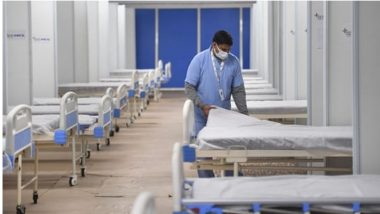New Delhi, December 18: Plasma therapy at a leading Delhi hospital saved the life of 52-year-old man, facing acute liver failure, after no donors were found in his family, doctors said.
The man was admitted to the Sir Ganga Ram hospital with symptoms of jaundice, followed by altered consciousness, developed ascites (accumulation of fluid in abdomen) and decreased urine output (acute kidney injury) and the later investigation detected him to be hepatitis B virus positive and a diagnosis of with acute on chronic liver failure (ACLF). Madhya Pradesh: Policewoman Performs Timely CPR On Road, Saves Life Of Elderly Man Who Suffered Heart Attack In Gwalior.
At this juncture, dialysis was considered and the patient was offered an option of liver transplant by the doctors, as his parameters indicated one month probability of survival to be around 50 per cent. "As there was no donor in the family, we offered an unusual option of plasma exchange (PLEX). We did a total of five sessions of PLEX for him. After second session, his jaundice started improving, his consciousness improved, and renal functions also started improving. He was continued on other medical therapy of which the most important is anti-viral therapy," said Dr. Piyush Ranjan, Senior consultant, at the Department of Gastroenterology.
The patient was discharged after 20 days of hospitalisation in a stable condition and one month of follow up his ascites (water in stomach) completely resolved and jaundice had normalised. Kolhapur Cardiologist Dr Arjun Adnaik Restarts Patient’s Heart After He Suddenly Suffers Heart Attack and Falls Unconscious in Front of Him, Watch Video.
"Plasmapheresis is increasingly being used as a bridge for liver transplant and in many cases, a large proportion of these patients may recover by the control of other factors. Like in our patient, treatment of Hepatitis B virus with medication was continued. So in this situation PLEX acted as support to the failing liver.
"PLEX is a procedure like hemodialysis where the blood is removed from the patient and the cellular components (RBC, WBC and platelet) are separated from plasma by centrifugation in the machine. The plasma is discarded and fresh plasma (FFP) and albumin is mixed along with the cellular components and returned back to the patient," the doctor said.
He said that the plasma contains a lot of toxic products which are being produced after the injury to liver. Since in PLEX, entire plasma is removed so all the toxic products are removed as compared to dialysis and MARS where the removal is limited by the pore size.
(The above story first appeared on LatestLY on Dec 18, 2022 10:22 PM IST. For more news and updates on politics, world, sports, entertainment and lifestyle, log on to our website latestly.com).












 Quickly
Quickly




















